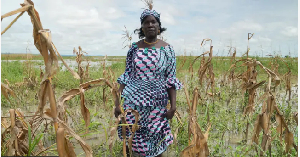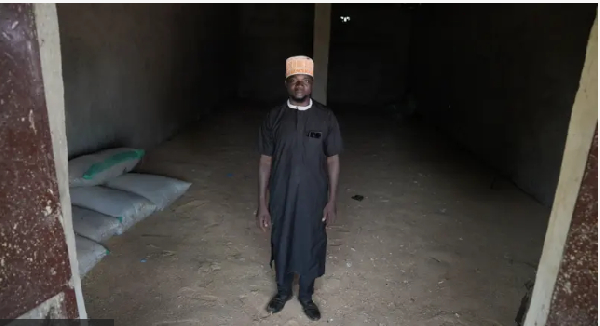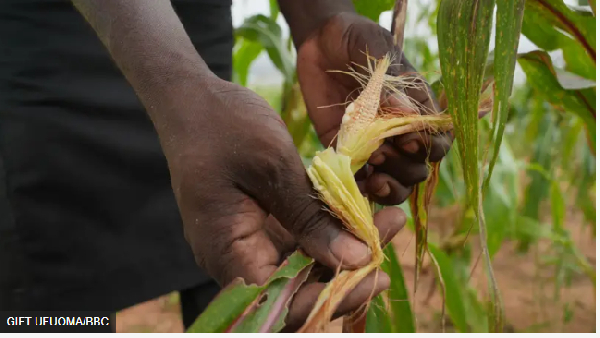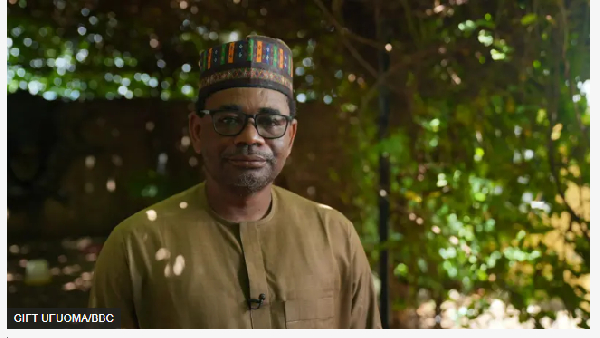 Mema Fwa lost most of her farm harvest sake of flood and drought
Mema Fwa lost most of her farm harvest sake of flood and drought
Mema Fwa, wey be Nigerian maize and okra farmer no fit believe say she lose evritin she bin plant dis season to scarcity of water and floods.
Fwa don dey farm for one remote community for Adamawa state north-eastern Nigeria for 25 years.
She say di past five years na di most challenging sake of di floods.
“Dis year na my worst farming season,” she tok.
Di farm of di 55 years old widow dey filled with water na only with boat dem fit access di place.
As we reach to inspect wetin remain for her farm, she sigh wit sadness.
“For di beginning of di season for April, my plants destroy due to lack of sun and rain,” she tok.
“By July, rain start to fall so we bin decide to farm again, and di crops start to bring food, but floods kon destroy evritin.
“Di day I see say my farm dey flooded, I no fit sleep. Dem later rush me to hospital. Now I get high blood pressure. I no dey happy becos I no fit provide for my family.”
Like Fwa, many pipo for her farming community dey experience plenti losses dis year becos of climate change. Di pipo wey bin manage to grow crops start to dey harvest early as dem dey expect more floods.
Muhammed Sadiq Muhammed, Adamawa State commissioner for environment, say dem neva know how di situation go be.
“Dis na one of di worst farming seasons wey we get for Adamawa state, wey dey experience scarcity of water and flooding at di same time,” im tok.
“We no fit produce enof to feed oursefs, not to tok about di one we go sell across di kontri.”
In neighbouring Taraba state, na scarcity of water inside of flooding wey don dry crops and and affect di livelihood of farmers.
Dis year, Rabiu Musa bin hope to harvest at least one thousand bags of maize afta im collect loan from bank.
But a poor rainy season mean say dem no go fit harvest plenti wey lead to empty barns.
Im say im go dey lucky to harvest just 20 bags.
“We bin fast, pray, and even share di maize to pipo, as we dey ask God for mercy so dat rain go fall. Many pipo lose dia their investment and odas give up. Some pipo die sake of wetin dem loss,”im tok.
Di 36-year-old farmer say im no know how im go pay back im loan and provide for im more dan 40 dependants.
“I am no dey happy anytime I go my farm. I dey always come back home with headache. I feel like say I go fall down. I loss evritin and I not get it back again. I feel helpless,” Im tok.
Unpredictable weather
Most of Nigeria food crops dey come from di north, and di north-eastern region na im be di big suppliers of rice, maize, and cassava.
In recent years, extreme weather events don increase across West and Central Africa with devastating effects.
Kouacou Dominique Koffy, di UN Food and Agriculture Organisation (FAO) representative for Nigeria, tell di BBC News say almost di entire west Africa region dey affected by flooding dis year.
“About 52 million pipo dey insecure about food for west Africa and di root causes na kasala, climate change and soil management issues. Climate change don cause a huge economic loss to farmers for di region,” im tok.
For Nigeria, unpredictable weather patterns don scata di planting and harvesting timetable, wey don cause low crop harvests. Di region experience one of di most devastating floods for 2022, wey kill at least 300 pipo, thousands displaced, e wash out large areas of farmlands.
Dis year flood situation across Nigeria don become a major humanitarian crisis, with 31 states and 180 local goment areas (LGAs) seriously affected.
According to di United Nations Office for di Coordination of Humanitarian Affairs (OCHA), more dan one million pipo dey affected.
At di same time, Nigeria dey face cost-of-living crisis with food inflation at an annual rate of 37.5%. More dan half of do kontri wey get 200 million population dey multi-dimensionally poor, according to goment estimates, and millions already dey face hunger even bifor di impacts of di floods.
“Due to di floods, we lose around 850,000 metric tons of food wey for feed 8.5 million pipo during six months. Dis na sometin wey be big challenge,” FAO Koffy tok.
Specialist crops
For many farmers wey dey affected by scarcity of water and floods dis year, dia main concern na to producing enough food to feed dia families.
For February, di Taraba goment bin announce efforts to boost agricultural production and enhance food security for di state.
“We need to shift from agriculture to climate-smart agriculture, wey go introduce innovation, water management and water control, to allow farmers to produce di entire year and gain more money,” Koffy tok.
Adamawa State Commissioner for di Environment, Muhammed Sadiq Muhammed, say di goment don set up one ‘’food security team’’ to chook eye for di mata.
“Di team go sensitize di farmers and engage with a research team for Ibadan to bring water scaarcity-resistant seedlings wey we fit give to our farmers. We go give dem di input and di fertilizer, so dat we fit get a dry season output,” im tok.
Trials for East Africa bin don show say genetically modified water scarcity-resistant crops fit increase yields by up to 30%, even though farmers must buy dem evri year, wey go add to dia financial burden.
On dia farms, Mema Fwa and Rabiu Musa dey wait to find out if dem fit benefit from dis schemes. Even though dia options no plenti, dia hope be say dia normal dry season crops go bring plenti harvest wey go dey enough to feed dia families until next year.
“I no get strength like bifor, I go farm small so dat my family go eat. I hope relatives go kontinu to help. If not, we go rely on God to sustain us,” Fwa tok.

Empty barns mean say Rabiu Musa no go fit repay im loans.

Low harvestsake of water scarcity fit cause food shortage for Nigeria

Adamawa state goment dey try to do water get seedlings wey fit do well without water to increase harvests.
Additional reporting by Yusuf Akinpelu, Gift Ufuoma and Buhari Muhammad Fagge